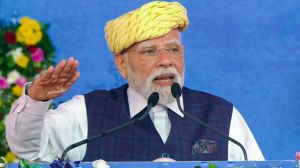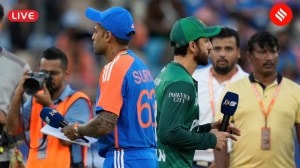Last phase ends with heavy turnout, 17 deaths
PATNA, NEW DELHI, FEBRUARY 22: The final phase of assembly elections in Bihar, Haryana, Orissa and Manipur witnessed unusually high voter ...

PATNA, NEW DELHI, FEBRUARY 22: The final phase of assembly elections in Bihar, Haryana, Orissa and Manipur witnessed unusually high voter turnout, but left a trail of 17 dead and several injured in poll-related violence in Bihar and Manipur.
After bearing the brunt of the Naxalite attacks in the first phase of polling in Bihar, security forces struck back today during the final phase killing at least 14 “booth-grabbers,” including notorious criminal Zakir Mian in Bettiah. Widespread violence marked the day which witnessed a high voter turnout of over 60 per cent and the arrest of more than 500 people.
Police sources said that Zakir Mian, who has figured in the TV show India’s Most Wanted, and his armed associates were busy capturing booths for his brother who is an Independent candidate. Mian, who carried a reward of Rs 1 lakh on his head, was stopped by security personnel and in a gun battle was killed with six of his men.
In North Bihar, widespread violence was reported as rival parties used muscle power to intimidate voters. In Gobindganj, criminals from Uttar Pradesh tried to capture the booths for their mafia associate and Independent candidate Rajen Tiwari. They clashed with local residents following which two people were killed. One woman was killed in Mirganj in a clash between supporters of the Samata and the CPM.
Bihar DGP K A Jacob expressed his happiness at what he called “the peaceful conclusion” of the election. According to him, only nine had been killed.
But both the BJP and the Congress charged the Election Commission with utter failure to “check the reign of terror.”
Senior BJP leader and convenor of the party’s campaign committee Ravi Shankar Prasad alleged that a section of state government officials openly worked in favour of RJD candidates and looked the other way when booths were being looted.
Despite the waning clout of the RJD, police are still wary of Sadhu Yadav, Laloo’s brother-in-law. Though an arrest warrant was issued against him, he is still at large. Last night, Sadhu Yadav, with his associates, attacked the Gopalganj police station and forced the staff there to release Superintendent of Police Murari Lal Meena has filed an FIR and ordered the “immediate” arrest of Sadhu Yadav.
In another incident on the eve of the polls, Ghulam Rasool, Singwara bloc JD(U) president was stoned to death by unidentified assailants while he was canvassing for the NDA candidates.
About 500 persons were arrested in the state and repolling could be ordered in nearly 1500 polling stations, according to the Election Commission.However, Chief Election Commissioner M S Gill expressed his satisfaction with the way the polls had turned out, underscoring the performance of the Bihar police and central forces in ensuring a peaceful poll.
In Manipur, where a record 75 percent of the electorate exercised their franchise in the 32 constituencies that went to the polls today, three persons were killed and three others injured in an incident in Ikubazaar in Imphal East constituency. Polling was peaceful in the rest of the state and very few repoll requests are likely to be made, according to Gill.
Haryana, where for the first time electoral identity cards were made mandatory, recorded 70 per cent voter turnout. Despite apprehensions that making ID cards mandatory for voting, the Election Commission expressed its satisfaction that the cards had worked out well.
Together with the Electronic Voting Machines (EVMs) which had been pressed into service in all the assembly constituencies, the Haryana polls saw two new features, both of which appear to have worked satisfactorily.
Though the EC in its order making the ID cards mandatory had given voters many alternates in place of the electoral card, like ration cards, drivers licence, employees cards, passports, etc, it was feared that women would be the sufferers since many poor and marginalised women have no means of establishing their identity. But these fears were dispelled by the EC.
“Women turned up in large numbers, and they had no problems with the EVMs or about having to produce some kind of ID,” said Gill. With the Haryana experiment, electoral IDs are here to stay. The next set of states going to the polls, Kerala, Pondicherry, West Bengal and Assam, where assembly elections are due next year, have already been warned that electoral ID cards will be mandatory for them.
In Orissa, some 60 per cent voter turnout was recorded in 77 assembly constituencies, with the cyclone-hit districts showing no difference in voter enthusiasm. There were no major incidents of violence or poll-related malpractices, Gill said “The polls were largely peaceful and there is nothing to report on Orissa,” he told journalists. Counting will begin on February 25.
Photos



- 01
- 02
- 03
- 04
- 05




























